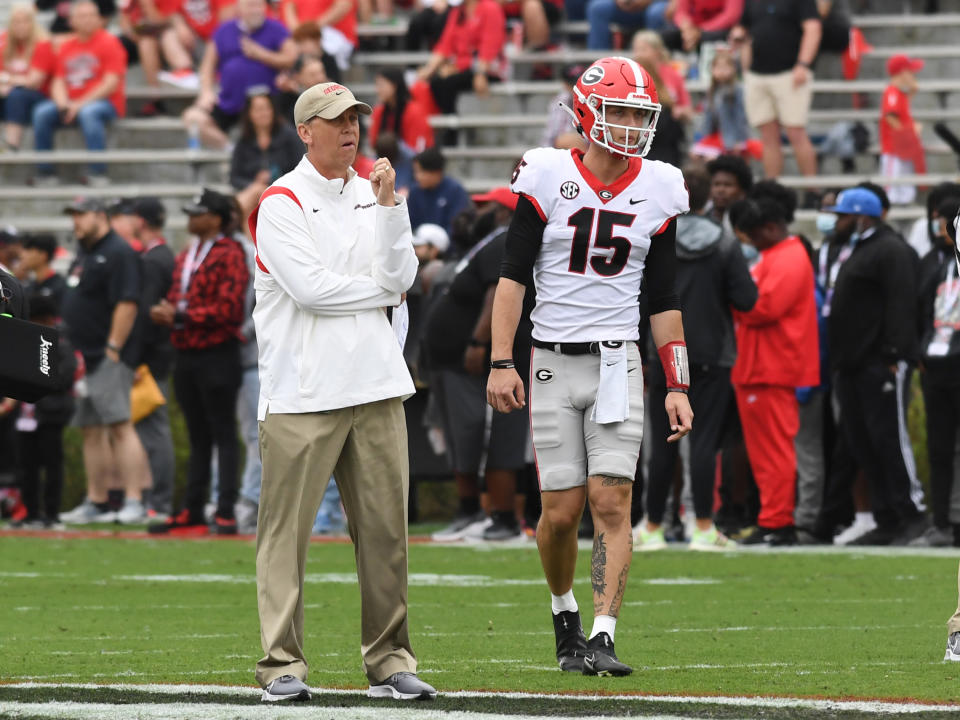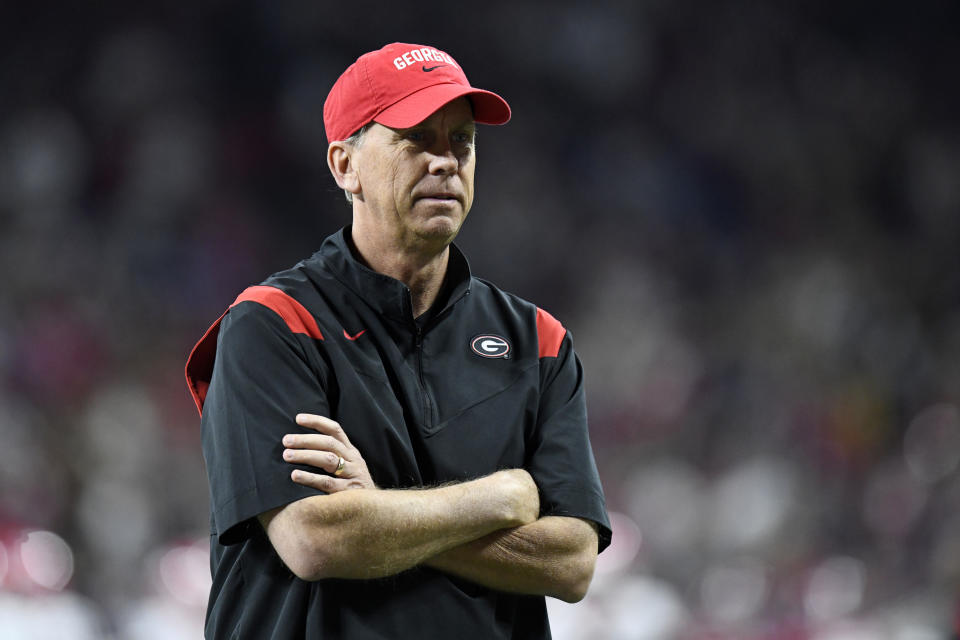Georgia fans’ ears are still ringing from the Dawgs’ miracle last-second victory over Ohio State in Saturday’s Peach Bowl, but it wasn’t all that long ago that Georgia head coach Kirby Smart walked off that same Mercedes-Benz Stadium field looking like a relic, a dinosaur, a holdover from a bygone era.
The date was December 7, 2019; the game was the SEC championship; and the then-fourth-ranked Bulldogs couldn’t even throw a scare into the Joe Burrow-led LSU Tigers. Burrow masterminded a 37-10 win over Georgia that wasn’t even that close, a beatdown so complete that it both clinched Burrow’s Heisman candidacy and consigned Georgia, once again, to the ranks of regular-season tough guys who wilted when the games mattered.
Comparing anyone to LSU-era Joe Burrow and any offense to the 2019 Tigers is an exercise in futility, but even so, that game showed just how far off the pace Georgia had slipped. Georgia’s quarterback that season was Jake Fromm, who’d led the Bulldogs to the national championship game two years earlier but sputtered down the stretch in 2019. By the time of that SEC championship, Fromm was on a five-game run of sub-50-percent completions, and his two interceptions against LSU doomed any chance the Dawgs had of staying competitive.
The grumbling around Athens grew into growling. Something had to change, pronto. Something did, and three years later, Georgia is playing for its second straight national title.
That something: an itinerant, then-unemployed career coordinator who has unlocked Georgia’s offense, turned a walk-on into a Heisman finalist, and positioned the Bulldogs as college football’s next great dynasty. When Smart went looking to level up his struggling offense, he rung up Todd Monken, and that has made all the difference. Monken was coming off a one-year stint as the Browns’ offensive coordinator, a tenure that ended abruptly when the Browns dismissed head coach Freddie Kitchens and the incoming Kevin Stefanski cleaned house. Cleveland was the latest in a 30-year, 11-stop career that encompassed everything from the NFL (Browns, Jags, Bucs) to college football’s elite (Notre Dame, LSU) to, well … Grand Valley State. In his lone head coaching stint, he took a Southern Miss team that had gone 0-12 the year before he arrived and transformed it into a 9-5 squad within three seasons.
Monken crafts complex, multilevel offensive schemes that, at their heart, follow a simple philosophy: “You recruit good players,” he said prior to the Peach Bowl. “You have a structure and a system. And then you go to work.”


Of course, the structure and the system work a whole lot better when you have recruits on the level of a Georgia. Under Monken’s guidance, Georgia went from being ranked 59th nationally in total offense in 2019, the year before he arrived, up to eighth this season. The Bulldogs’ improvement through the air has flown on a similar trajectory, from 72nd in passing yardage in 2019 up to 15th this year … and, along the way, setting the stage for a national championship and Georgia’s first Heisman finalist since running back Garrison Hearst in 1992.
“I feel like before he got here, I didn’t really understand football,” said Georgia QB Stetson Bennett, who finished fourth in Heisman voting. “It’s weird, even in 2020, [I] didn’t really know what was going on … Maybe I’m a slow learner, but finally it did start clicking whenever he would tell me the same thing for the 20th time.”
“When you have talent and they play their rear ends off and they work and have attention to detail,” Monken said, “the game is just a byproduct of that.”
The result is an attack that draws the admiration even of the coaches tasked with stopping it. “The versatility of the offense with the multiple tight ends who are extremely talented, receivers who can make plays in various ways throughout the field, running backs who can attack you both inside and outside and a quarterback who just does a marvelous job of managing the whole thing,” Ohio State defensive coordinator Jim Knowles said just days before having to face Monken’s creation. “It’s a complete offense. It’s developed like an NFL offense.”
Monken’s modernization of the Georgia attack has drawn understandable attention. LSU wanted him for its offensive coordinator slot, Purdue was reportedly looking at him for its head coaching job, and NFL teams always have his number. Georgia responded by locking Monken down, signing him prior to the season to a three-year extension that will pay him $2 million per. That’s enough to buy his loyalty, if not necessarily security.
“This is a business,” he said. “I’ve done organizations where [they’ve said] ‘This is a family.’ This isn’t a family. You’re going to fire me if we suck, so don’t say it’s a family.”


One day — perhaps in two more seasons, perhaps sooner — the wandering coordinator will head on down the road to his next gig. Until that day, Monken is instilling a philosophy of consistency that leads to a culture of excellence. Winds can shift quickly in college football — as Clemson can testify, the distance between championship contender and playoff onlooker is a short one indeed — but Monken is proving to be an essential element of the dynasty Smart is building in Athens.
“Honestly, the most important thing that he’s done is just stay consistent,” Bennett said. “We do have a lot of knuckleheads who need time and reps and all that stuff to learn. So sometimes he’s not very patient, but he’s very consistent, and we hear the same thing every single day. And eventually you’re going to start doing things right if you hear that every day.”
Thanks to Monken — and Bennett, and Smart, and a hundred other red-and-black factors — Georgia is now so consistent that the rest of the sport is trying to catch up.
_____
Contact Jay Busbee at jay.busbee@yahoo.com or on Twitter at @jaybusbee.
